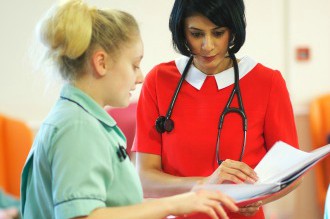How training up HCAs takes the burden off our practice

The problem
Peterborough is one of the fastest growing cities in England, and we’re the fastest growing practice in the city with an average annual growth of 2,500 patients. In the last year our list size increased from 18,000 to 21,000 patients in one of the city’s most deprived areas.
More than 50% of the practice population is Eastern European, many of whom speak little or no English. This makes it difficult for the population to book an appointment over the phone or for telephone triage. We have the highest number of children under five and pregnant patients in the CCG. Peterborough is also struggling with recruitment and there is an increasing ratio of patients to doctors. The practice has run a system of open access for many years, which allows any of our registered list to see a clinician on the morning of their illness without ringing to book an appointment, but were starting to struggle to keep up with demand.
What we did
We decided to train up our nurses and healthcare assistants to help us more in the consulting room. The nurses were trained up with consultation skills for minor illness and injury so they are able to see a fair number of patients presenting in the open access surgeries with doctors providing supervision and assistance where needed.
The HCAs work alongside doctors and were trained up to take a history, perform basic investigations (pulse, temperature, oxygen saturations) based on presentation and document these findings in patient records. They also help with completing online requests for investigations, book follow ups appropriately and are audio typists to their clinician.
As many of our staff are from the same community that we work in they can help translate during the consultation. This model has developed over the last 20 years with the practice working in national pilots for nurses and HCAs for developing skill-mix and should be considered evolutionary rather than revolutionary.
Results
This is a shift in the way care is delivered. We see more patients (250-280) in our morning surgery than our local hospital does in its ED department over a 24 hour period. This results in fewer home visits and a lower level of admissions to hospital.
This way of working has increased productivity and reduced the stress and strain on the medical workforce. The HCAs gather information from patients, leaving the nursing and medical staff to focus on interpretation and making management and treatment plans. We estimate that around 30% of the consultation (data collecting, documentation, referral administration and requesting tests) is managed by HCAs in this way whilst the doctors remain responsible for the decision making and consultation.
This has allowed us to engage with national and local agendas – for example we completed over 800 health checks despite having a target of 300 over the last year.
GPs can feel quite isolated working in the traditional way and our model allows working in teams – with the HCA and nurses. We have achieved an outstanding rating for two CQC inspections and have maintained good clinical outcomes despite the challenges of rapid patient growth and the patient population we serve. We were nominated for GP Team of the year at the General Practice awards for this project.
The model has challenged the traditional doctor-patient model and for some would be unpalatable. But we feel it helps doctors focus on more complex patients and the part of the consultation where they are needed – making clinical decisions and management plans.
Challenges
This way of working requires more space as each doctor works with two HCAs who have their own clinical rooms. With doctors using an office space this means that 2.5 times the normal consulting space is needed. Therefore we have had to develop our infrastructure, which has led to a greater financial outlay. We have had to work with our commissioners to help them understand this aspect as it is difficult within the NHS due to the financial strains and the need to support struggling practices.
For this model to be safe and effective, there needs to be constant supervision and a training programme. We are a training practice and we have freed up two senior doctors whose main role is to provide the training and supervision on a daily basis to make sure all staff are fit to carry out the tasks delegated to them. We also engage external teachers as subject matter experts on safeguarding adults and children, mental health training, child sexual exploitation and helping patients with disabilities.
The future
We do not feel we have ‘arrived’ at a perfect solution to the problems that primary care faces. We are constantly evolving in an effort to provide a better, more effective way of working, supporting and developing our workforce where possible.
Our model is one that can be replicated, however it would need investment in GP surgery infrastructure and investment in training and supervision of staff to ensure it’s safe and effective.
Dr Neil Modha is a GP Partner at Thistlemoor Medical Centre in Peterborough and ex clinical officer of NHS Cambridgeshire and Peterborough CCG









